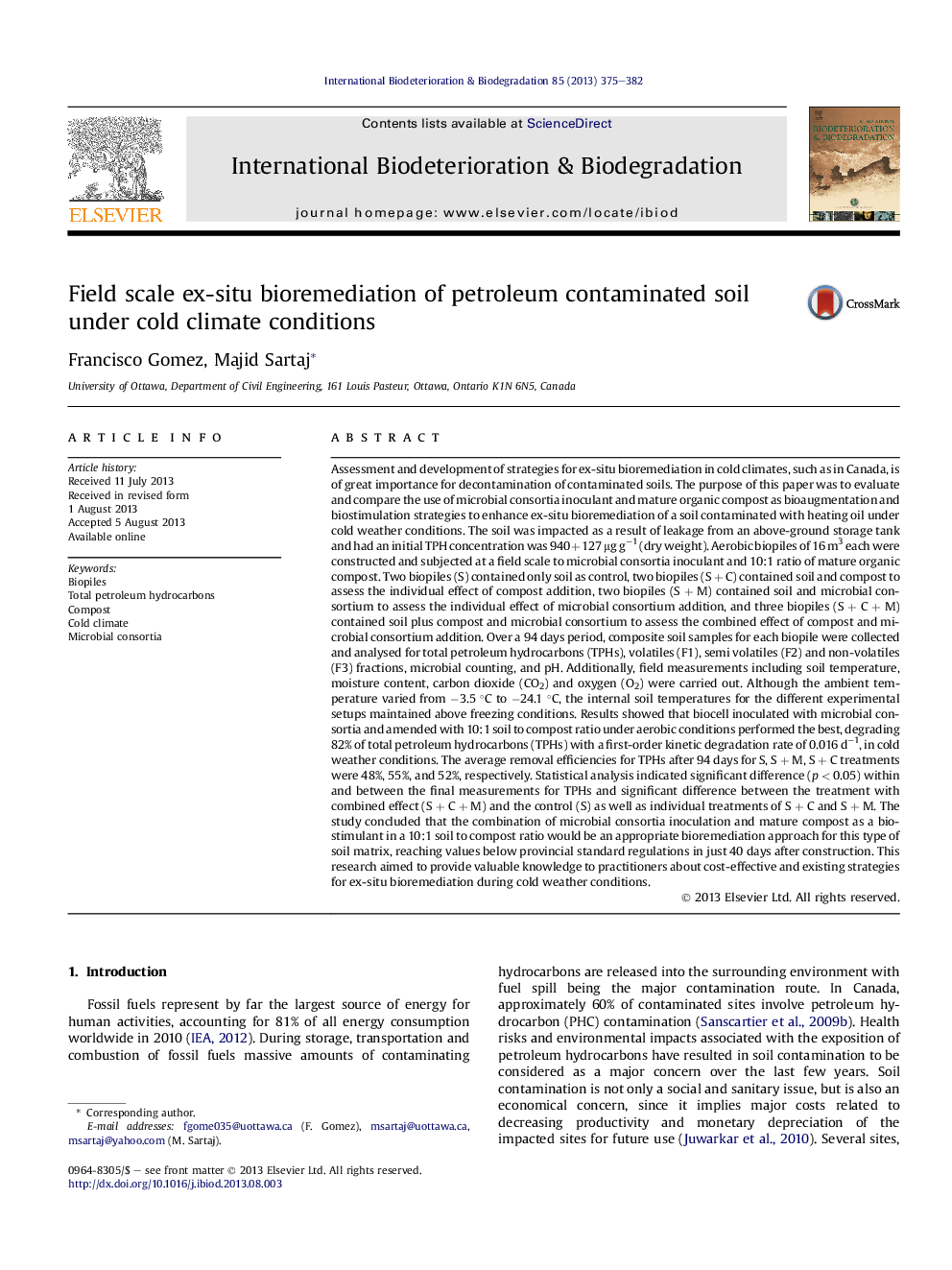| کد مقاله | کد نشریه | سال انتشار | مقاله انگلیسی | نسخه تمام متن |
|---|---|---|---|---|
| 6289330 | 1616330 | 2013 | 8 صفحه PDF | دانلود رایگان |
عنوان انگلیسی مقاله ISI
Field scale ex-situ bioremediation of petroleum contaminated soil under cold climate conditions
ترجمه فارسی عنوان
مقیاس زیست محیطی بیرونی زمین های آلوده به نفت در شرایط آب و هوایی سرد
دانلود مقاله + سفارش ترجمه
دانلود مقاله ISI انگلیسی
رایگان برای ایرانیان
کلمات کلیدی
موضوعات مرتبط
علوم زیستی و بیوفناوری
علوم محیط زیست
علوم زیست محیطی (عمومی)
چکیده انگلیسی
Assessment and development of strategies for ex-situ bioremediation in cold climates, such as in Canada, is of great importance for decontamination of contaminated soils. The purpose of this paper was to evaluate and compare the use of microbial consortia inoculant and mature organic compost as bioaugmentation and biostimulation strategies to enhance ex-situ bioremediation of a soil contaminated with heating oil under cold weather conditions. The soil was impacted as a result of leakage from an above-ground storage tank and had an initial TPH concentration was 940+ 127 μg gâ1 (dry weight). Aerobic biopiles of 16 m3 each were constructed and subjected at a field scale to microbial consortia inoculant and 10:1 ratio of mature organic compost. Two biopiles (S) contained only soil as control, two biopiles (S + C) contained soil and compost to assess the individual effect of compost addition, two biopiles (S + M) contained soil and microbial consortium to assess the individual effect of microbial consortium addition, and three biopiles (S + C + M) contained soil plus compost and microbial consortium to assess the combined effect of compost and microbial consortium addition. Over a 94 days period, composite soil samples for each biopile were collected and analysed for total petroleum hydrocarbons (TPHs), volatiles (F1), semi volatiles (F2) and non-volatiles (F3) fractions, microbial counting, and pH. Additionally, field measurements including soil temperature, moisture content, carbon dioxide (CO2) and oxygen (O2) were carried out. Although the ambient temperature varied from â3.5 °C to â24.1 °C, the internal soil temperatures for the different experimental setups maintained above freezing conditions. Results showed that biocell inoculated with microbial consortia and amended with 10:1 soil to compost ratio under aerobic conditions performed the best, degrading 82% of total petroleum hydrocarbons (TPHs) with a first-order kinetic degradation rate of 0.016 dâ1, in cold weather conditions. The average removal efficiencies for TPHs after 94 days for S, S + M, S + C treatments were 48%, 55%, and 52%, respectively. Statistical analysis indicated significant difference (p < 0.05) within and between the final measurements for TPHs and significant difference between the treatment with combined effect (S + C + M) and the control (S) as well as individual treatments of S + C and S + M. The study concluded that the combination of microbial consortia inoculation and mature compost as a biostimulant in a 10:1 soil to compost ratio would be an appropriate bioremediation approach for this type of soil matrix, reaching values below provincial standard regulations in just 40 days after construction. This research aimed to provide valuable knowledge to practitioners about cost-effective and existing strategies for ex-situ bioremediation during cold weather conditions.
ناشر
Database: Elsevier - ScienceDirect (ساینس دایرکت)
Journal: International Biodeterioration & Biodegradation - Volume 85, November 2013, Pages 375-382
Journal: International Biodeterioration & Biodegradation - Volume 85, November 2013, Pages 375-382
نویسندگان
Francisco Gomez, Majid Sartaj,
